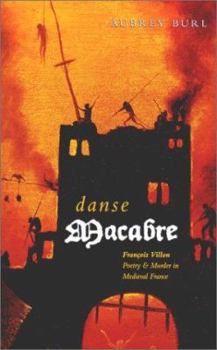Danse Macabre
Select Format
Select Condition 
Book Overview
Francois Villon (1431-?1465) is one of the great enigmas of French medieval history: a lyric poet of beauty and depth, he was also a murderer, pimp, thief and denizen of the underworld of 15th-century... This description may be from another edition of this product.
Format:Hardcover
Language:English
ISBN:0750921773
ISBN13:9780750921770
Release Date:January 2000
Publisher:Sutton Publishing
Length:242 Pages
Weight:0.85 lbs.
Dimensions:1.0" x 5.2" x 8.1"
Customer Reviews
2 ratings
The original bad boy of French literature
Published by Thriftbooks.com User , 22 years ago
Before Rousseau, Sade, Baudelaire, Rimbaud, Celine, Artaud, and Genet there was Francois Villon, medieval poet, thief, and murderer who disappeared from history's radar altogether in 1463 and was never heard from again. This short, intimate biography discusses Villon's life with an eye to the wider context of his times. One problem I had is that the book spent so much time examining the historical circumstances of medieval Paris that it often lost sight of Villon's life. Which is fine: medieval Paris was a dark and fascinating place, and the book includes intriguing glimpses of contemporaries like Gilles de Rais, an infamous aristocrat and child murderer. However, at only 225 pages (and several pictures) this doesn't leave much room to discuss the very full life of Villon himself--it left me wanting more. Granted this is not the fault of the biographer because so much of Villon's life is unknown that a full and satisfactory study is impossible. Contrary to a previous admirable review, "Danse Macabre" does include healthy doses of Villon's poetry accompanied with text in the original French.
The life and times of a scoundrel poet
Published by Thriftbooks.com User , 24 years ago
As a poet living in Paris during 15th century, Francois Villon did not leave a large literary legacy (about 3300 lines). His work rarely appears in anthologies. Perhaps because of the graphic sexual subject matter of some poems, few risked faithful translation of his work until the past twenty years. Not that Villon was a hack. After all, this is the author of one of the widely quoted lines in French poetry: (trans) "But where are the snows of years gone by?" In Danse Macabre, Aubrey Burl fashions a thoroughly engrossing depiction of the life and times of a talent poet whose work was overshadowed by frequent scandal.Had Villon lived in the present, the mixture of art and misbehavior would raise few eyebrows. We have grown accustomed to musicians and writers as poster children for depravity. None the less, few can rival Villon's criminal record (murderer, thief, pimp, corruptor of innocence). He left few laws and social mores unscathed.First, and foremost, Danse Macabre is a lively biography of Villon. Burl tells the tale of a complex and fascinating character, often using Villon's poetry to buttress inferences and to give him a "voice." The historical context is carefully drawn. We see a Paris with streets of mud, rife with disease, and roamed by packs of wolves. Torture and executions were elevated to art forms, presumably all in the name of justice. Add to that mix a man of limited means, struggling to survive, consumed by a substantial sexual appetite, but with a gift for poetry. Not surprisingly, his poems were sympathetic to human foibles and frailty. It all makes for lively reading. However, this is not historical figure being used as an embryo for a fanciful, sensational story. Aubrey Burl interprets history, based on extensive research, rather than re-writing it. Scholarship is evident on every page.The poetry of Francois Villon constitutes a small fraction of Danse Macabre. When I purchased the book, I was hoping for a healthy dose of poetry with the history. I came away with a detailed portrait of the poet, but left hungry for his poetry. Burl cannot be faulted for my preconceived notions. Even a talented writer of fiction would be challenged to create a more interesting and complicated a character as Villon. Enjoy.






